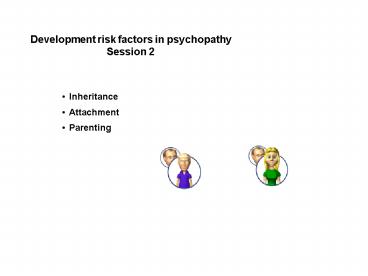Development risk factors in psychopathy PowerPoint PPT Presentation
1 / 14
Title: Development risk factors in psychopathy
1
Development risk factors in psychopathy Session 2
- Inheritance
- Attachment
- Parenting
2
Nature nurture
Nature or nurture? yes!
- heritability of ASP (as well as prosocial
behavior) estimated at 50 - trauma modifies the risk
- incompetent parenting further modifies the risk
3
Attachment
Family Considerations Attachment Theory
Offender Development
4
Normal attachment
Normative Healthy Attachment
- eye contact
- cooing
- crying
- smiling
- reaching
- grasping
- approaching
- following
- discomfort
- hot/cold
- hungry
- happy
- afraid
- angry
- tired
- wet
Availability Sensitivity Responsiveness Consistenc
y
- prolonged gazing
- kissing
- cuddling
- fondling
- high voicing
- rocking
- rhythmic contact
- seek closeness reciprocity
- frustration tolerant
- high intimacy
- long lasting relationships
- high levels of commitment
- high relationship satisfaction
- stress resilient
- fewer physical psychological problems
- less aggressive, more cooperative
- high belonging
- Secure attachment
- trust
- safe/secure
- regularity
- easier to comfort
- more affectionate
5
Poor attachment
- mental illness
- postpartum depression
- attachment disordered
- chemical abuse
- physical illness
- multiple caretakers
- frequent moves
- criminal behavior
- preoccupation
- separation/divorce
- death
- PDD
Attachment Problems
- Unresponsive to Comforting
- severe illness
- premature birth
- surgeries/pain
- hyperactive
- hospitalizations
- colicky
- autistic
- FAS/FAE
- physical abuse
- domestic violence
- absence
- neglect
- inconsistency
- over/under stimulate
- over/under attentive
- rejecting
- Insecure Attachment
- untrusting
- fearful
- angry
6
Effects of multiple caretakers
The effects of multiple caregivers
- Insecure attachment unstable image of
caregiver - Confusion over different caregiver
household rules - Poor, variable boundaries
- Conflicted guilt over attachment to foster
parents vs.
parents - Mistrust, caution (due to previous abuse)
- Displace anger onto new caregivers from past
resentments - Learn superficial charm to manipulate others
- Play people off against each other
- Continuous testing to see if they are rejected
- Fear of removal, loss, grief closeness means
pain - Preoccupation with fantasy of returning to family
of origin
7
Why people manipulate
- Learned way of relating
- Poor repertory of coping mechanisms
- Difficulty forming maintaining relationships
- Survival and fear
- Adapting to multiple caretakers
- Distrust of others
- Competing for attention
- Narcissism
- Power and control
They do it because it worksshort term
8
Adjustment low self efficacy, low confidence,
emotionally expressive labile, intense, too
close too fast, inconsistent, dominating,
controlling, unsatisfactory intimacy, jealousy,
obsessive, compulsive, idealizing, oversensitive,
shame prone, deficient problem solving, dislike
authority rules, self-defeating, Offenders
nonthreatening, seek immature victims, groom over
time, quasi-romantic relationships, (borderlines,
bipolar)
Internal Working Model Types of Attachment
Preoccupied Anxious- Ambivalent
Secure
Available, responsive, nurturing, consistent
Neglecting, avoidant, indifferent
Avoidant- Fearful
Avoidant- Dismissive
Ambivalent, inconsistent, over/under responsive
Violent, abusive, threatening, punitive, rejecting
Adjustment self blame, not seek or accept help,
fear rejection, fear disclosure closeness, lack
trust, emotionally aware but unexpressive,
passive, superficial intimacy, not recall
childhood, hypervigilant (depressive,
schizoid) Offenders engage in impersonal, single
contact sex, acquaintance rape, cruising
Adjustment uncaring, avoid closeness,
non-disclosing, high confidence, aloof,
indifferent, impatient, shallow, vain, hostile,
arrogant, grandiose, reject treatment, selfish,
controlling, AODA, vengeful (narcissistic,
psychopathic) Offenders coercive assaultive,
no guilt, remorse, shame
(Bartholomew, Shaver, et al.)
9
Less easily-socialized youth require more
competent parenting to avoid personality disorders
10
Family bonding drugs
11
Early/adolescent onset
12
(No Transcript)
13
Developmental Pathways for Conduct Problems
14
Development arrow
Development of behavior disorders in youth
- Infancy
- Prematurity
- low birth weight
- brain injury
- FAS/FAE
- ADHD
- attachment
- hyperreactive
- colicky
- unhealthy
- disability
- pain
- multiple placements
- Environmental
- pop. density
- poor housing
- mobile residents
- discrimination
- media violence
- cultural norms
- no support svc.
- discrimination
- crime rate
- Peers
- delinquent/deviant peers
- antisocial sibs
- bullying
- rejection by norm group
- attention/recognition
- belonging
- act out
- revenge
PROBABLE OFFENSE
- Family
- cohesion
- flexibility
- poor boundaries
- inconsistent discipline
- poor supervision
- marital relationship
- handle emotions
- poor role modeling
- criminality
- physical, emotional,
- sexual abuse
- explicit sexuality
- disorganization
- cold, rejecting
- large family
- father absence
- long unemployment
- Personality-- What prevents you from offending?
- values (Its wrong)
- empathy (it would hurt others)
- consequences (Id get in trouble)
- ego dystonic (thats not me)
- shame/embarrassment (what would other think)
- esteem (Id feel awful)
- identification (wouldnt want that to happen to
me) - personal responsibility (I would be
responsible) - self monitoring control (Id stop myself)
- coping (other ways to deal with tension)
- Pre-family
- poverty
- single
- unwanted
- MI (depression)
- AODA
- teen/immature
- abused
- antisocial
- divorce
- assortative mating
- transgenerational problems

